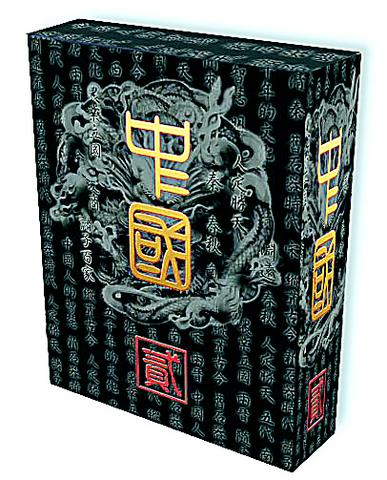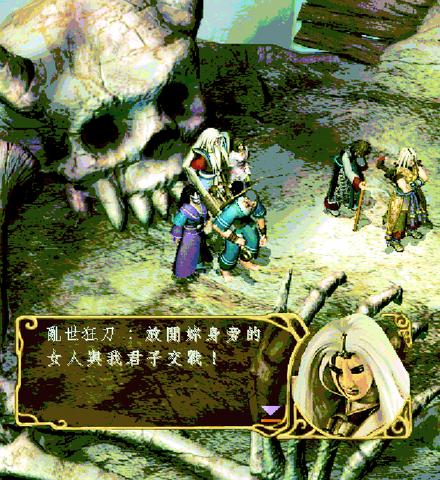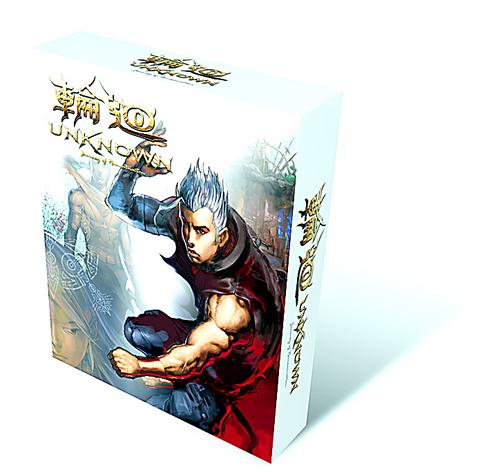China II: Everlasting Empire
By T-Time Technology
Scheduled release: End of August

In the lull after the release of major imported games such as Soldier of Fortune II, WC3, T-Time Technology (
If a player decides to play Taiwan -- an option that Civilization doesn't offer -- its rivals include Japan and Korea as well as the China across the Strait!
As with Civilization, China II is a turn-based strategy game, and the two are largely similar in terms of game play, with primary aims being to find fertile land in which to build a city and then develop the surrounding area building the foundations for population and military and scientific development.

"The main difference with Civilization is in the combat sequences," said Atwood Yen (嚴餘金) a member of the T-Time design team. "China II allows players to develop elite troops, and also to combine military units of the same type into larger and more powerful units. In addition, it is possible to create combined air, sea and land forces." During combat, play switches from the world map to a battlefield map, allowing the player to command individual units, with play moving forward turn by turn like chess.
Unknown: Journey of Reincarnation
By Electronic Art Taiwan

PHOTOS COURTESY OF THE MANUFACTURERS
Scheduled release: September
Taiwan game designers rarely venture away from role-playing and arcade formats, which makes the arrival of Unknown: Journey of Reincarnation (
The game's developers, Info Bank Technology Corp (

"Because the characters develop, this game also has some of the qualities of a role-playing game," Lin said. Moreover, characters can choose from over 100 action moves to develop their own special combat techniques."
There are many ways that players can draw on the mysteries of Atlantis to increase their abilities, discovering ways to call on special weapons, or improve their own offensive or defensive capabilities. In large scale combat, players can draw on a wealth of special abilities simultaneously in order to defeat otherwise overwhelming odds.
Thunder Blade: The Maniac
Interwise Mulitmedia Corp
Scheduled release: September
Interwise, a long-term associate of US Interplay and the distributor of the Baldur's Gate series of games, has finally decided to use that game's powerful game engine to power a local release based on the popular Pili Puppet TV series.
"It has taken over a year of discussion, planning and revision to get this far," said Jay Huang (黃杉全), marketing manager for Interwise. "Thunder Blade (霹靂狂刀) has already become wildly popular on television, and now we will offer everyone the chance to play this character and inhabiting a world of martial arts chivalry."
According to Huang, the RPG game was influenced by the spectacular graphics of the TV program from which it was derived, leading to the incorporation of more complex scenarios, multiple angles of vision and movements that that are still rare in the RPG game format. For example, when a character moves or runs into combat, the scenery around him moves in response to his actions, rather than remaining static.
The game also incorporates elements from Square's Final Fantasy series, allowing characters to call on up to six mythical beasts to come to their assistance, making the combat sequences even more elaborate and exciting. According to Louis Huang (
Han and Rome
By Softstar Entertainment Inc
Released June 2002
For games based on stories of Chinese martial arts and chivalry, one of the most successful must be the Sky Sword series (軒轅劍). While Softstar has continued to push this game with the recent released of an online version, titled Chain of Life, it has also decided to develop a military game based on Shogun: Total War which it has titled Han and Rome (漢朝與羅馬).
The game, released in June, works on the real-time strategy (RTS) model, and allows players to take the role of either China or Rome, providing options of military expansion through Asia, Europe and Africa, with many peoples, such as the Mongols, Goths and Egyptians coming on the scene. "The geographical expanse allows the players to operate in a wide range of environments and weather conditions, and they must adapt their strategy to these complex conditions," said Antonio Lu (
According to Lu, the main breakthrough for this game is the development of battle formations. With over 20 types of military units to choose from, the player must position them in an advantageous formation which makes use of the geographical factors as well."
All the above games have been developed primarily for a local audience and are currently only available with a Chinese-language interface.

Behind a car repair business on a nondescript Thai street are the cherished pets of a rising TikTok animal influencer: two lions and a 200-kilogram lion-tiger hybrid called “Big George.” Lion ownership is legal in Thailand, and Tharnuwarht Plengkemratch is an enthusiastic advocate, posting updates on his feline companions to nearly three million followers. “They’re playful and affectionate, just like dogs or cats,” he said from inside their cage complex at his home in the northern city of Chiang Mai. Thailand’s captive lion population has exploded in recent years, with nearly 500 registered in zoos, breeding farms, petting cafes and homes. Experts warn the

The unexpected collapse of the recall campaigns is being viewed through many lenses, most of them skewed and self-absorbed. The international media unsurprisingly focuses on what they perceive as the message that Taiwanese voters were sending in the failure of the mass recall, especially to China, the US and to friendly Western nations. This made some sense prior to early last month. One of the main arguments used by recall campaigners for recalling Chinese Nationalist Party (KMT) lawmakers was that they were too pro-China, and by extension not to be trusted with defending the nation. Also by extension, that argument could be

Aug. 4 to Aug. 10 When Coca-Cola finally pushed its way into Taiwan’s market in 1968, it allegedly vowed to wipe out its major domestic rival Hey Song within five years. But Hey Song, which began as a manual operation in a family cow shed in 1925, had proven its resilience, surviving numerous setbacks — including the loss of autonomy and nearly all its assets due to the Japanese colonial government’s wartime economic policy. By the 1960s, Hey Song had risen to the top of Taiwan’s beverage industry. This success was driven not only by president Chang Wen-chi’s

Last week, on the heels of the recall election that turned out so badly for Taiwan, came the news that US President Donald Trump had blocked the transit of President William Lai (賴清德) through the US on his way to Latin America. A few days later the international media reported that in June a scheduled visit by Minister of National Defense Wellington Koo (顧立雄) for high level meetings was canceled by the US after China’s President Xi Jinping (習近平) asked Trump to curb US engagement with Taiwan during a June phone call. The cancellation of Lai’s transit was a gaudy